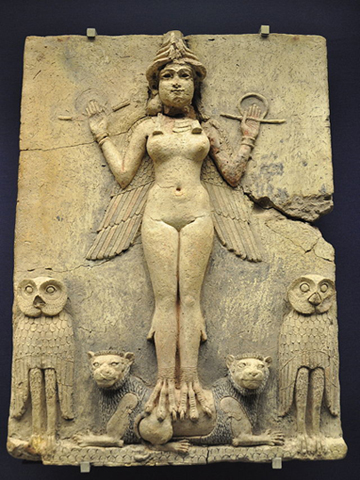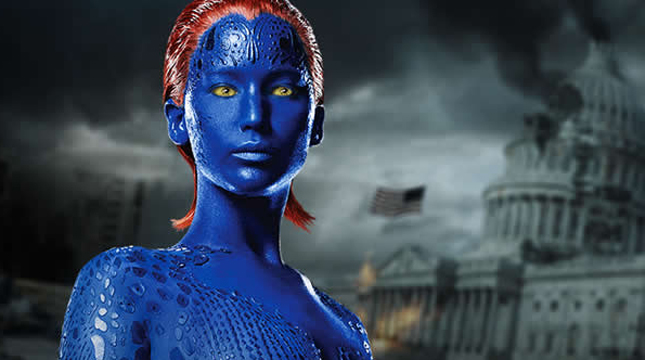Mystique, the True Leader of the X-Men
Opening note: except for a sidebar, this essay discusses only what’s contained in the X-Men films. So if anyone attempts to tell me “This problem is dealt with in issue X, page Y!” — don’t be surprised if my response tends to the curt.
 I’m profoundly allergic to messianic narratives, especially ones in which everyone is a tool for the godling’s quest for sanctity – and Marvel’s X-Men series employs this trope so heavily that following any story/character line more than cursorily threatens to put me in anaphylactic shock. Yet in the interests of being au courant I’ve seen all the X-Men films except for the unspeakable Last Stand, an ordeal I’ve weathered by focusing on the minor characters (who tend to be non-default) with occasional glances at Logan/Wolverine, who’s feminized despite his unsubtle cigar-chomping and Victorian sideburns. And so it came to pass that last night, knowing in advance it would annoy me into opining, I saw Days of Future Past.
I’m profoundly allergic to messianic narratives, especially ones in which everyone is a tool for the godling’s quest for sanctity – and Marvel’s X-Men series employs this trope so heavily that following any story/character line more than cursorily threatens to put me in anaphylactic shock. Yet in the interests of being au courant I’ve seen all the X-Men films except for the unspeakable Last Stand, an ordeal I’ve weathered by focusing on the minor characters (who tend to be non-default) with occasional glances at Logan/Wolverine, who’s feminized despite his unsubtle cigar-chomping and Victorian sideburns. And so it came to pass that last night, knowing in advance it would annoy me into opining, I saw Days of Future Past.
As I watched the expected lingering adoration of the male godlings’ angst, I realized whose story this has really been throughout the two origin prequels: unsung, demonized and finally erased, the column on which this house stands is Raven Darkholme/Mystique. In First Class she is shown to be the co-founder of X-Men and, like all women in such positions, she’s turned into Lilith – who was not created from Adam’s rib as a helpmate, but separately and concurrently, meant to be an equal partner. In Hebrew lore Lilith devolved into the Mother of Demons for the unpardonable crime of defying both Adam’s and Yahweh’s wishes to become the mirror for their self-admiration, the vessel for their seed.
Likewise, Mystique is demonized in X-Men for the unpardonable presumption of embarking upon a reality-grounded action path that avoids the self-righteous excesses of both the Charles Xavier/Professor X superego and the Erik Lensherr/Magneto id. In an additional parallel to Lilith, Mystique in the comics is one of the parents of Kurt Wagner/Nightcrawler, whose physical specifics are those of a medieval demon. Furthermore, by participating in Kurt’s genesis in male form, Mystique commits a cardinal sin in the patriarchal canon: she assumes the father role (the sin further compounded by the fact that Mystique is short on feminine-coded submissive “virtues”). In that respect, it’s interesting that Mystique is one of the few iconic shapeshifters who are female at their start; that highly subversive power is traditionally reserved for male trickster figures.
If we follow the film’s own logic, in Days of Future Past Mystique has been traveling all over the world at great risk for a decade, rescuing Mutants destined to become subjects in the horrific experiments of Bolivar Trask (who aims to create machines with Mutant abilities as a way of safeguarding humanity’s future – didn’t he watch ANY Hollywood films?). Throughout that time, the two Alpha menboys, Lensherr and Xavier, have literally sulked in their tents. This means that, unrecognized, unrewarded, unaided, laconic and matter-of-fact, Mystique has been the leader and savior of the Mutants.
Given Trask’s activities and goals, it’s not surprising that Mystique intends to eliminate him. Yet like “thoughtless” Pandora, Mystique’s measured, fully justified plan to kill just Trask (unlike Magneto’s far grander annihilation plans for all non-mutant Humans) apparently ushers in a horrible Terminator-type future that can be avoided by crippling her both physically and mentally – a task that Xavier and Lensherr, normally constantly bickering adversaries, discharge in harmonious convergence with zero hesitation or argument.
When the undermining of Mystique brings the universe back “into balance” (leaving her vulnerable to further rapine in The Last Stand), Wolverine, who acted as the messenger between future and past, is amply rewarded for restoring the status quo. Further devaluing Mystique’s actions, Trask is arrested for “selling military secrets” – not for vivisecting Mutants. Also excluded from reward even by just being present at the group hug is Kitty Pryde/Shadowcat, who made Wolverine’s time travel possible. Professor X and Magneto, Michael and Lucifer, are back to firmly ruling their respective domains.
But out there in the wind-swept dark, untamed and unbowed, still roams the feral loner who haunts the dreams and can foil the plans of self-satisfied men: Lilith, Morrighan… Catwoman, Mystique.
Related articles:
A Plague on Both Your Houses – Reprise
So, Where Are the Outstanding Women in X?
The Iron Madonna or: Kicking Ass While Female
Where Are the Wise Crones in Science Fiction?
“We Must Love One Another or Die”: A Critique of Star Wars
Parallel thoughts by C. C. Finlay
Images: 1st, relief believed to portray Lilith, Ishtar or Ereshkigal, Babylon ~1800 BCE, British Museum; 2nd, Jennifer Lawrence as Raven/Mystique in Days of Future Past



Mystique as Lilith. I like it, Athena.
How could you possibly not?! It even works as Hollywood high concept!
Great article, Athena.
Mystique has always been one of my favourite X-Men characters, going back to the comics. Professor X and Magneto were sanctimonious jerks, while Mystique was always the practical one. But in spite of every horrible thing he did over the course of five films and fifty years of comics, Magneto was always cast as the misunderstood radical (and reformed and reverted to villainy every five minutes or so), whereas Mystique usually was portrayed as an all-out villainess, even if her acts of villainy were usually confined to an unfortunate hobby of shooting presidential candidates and occasionally beating the entire X-Men team du jour and on one memorable occasion the Avengers.
I agree that she’s definitely a Lilith figure. Kurt/Nightcrawler is not her only child BTW. There’s also Graydon Creed, her son with Sabretooth (not a demon, but definitely a villain), and her adopted daughter Rogue, whom she raised together with a female partner. Yes, comic Mystique is bisexual.
Exactly as you say, Cora. I knew of the other children of Mystique, biological and adopted, but chose to highlight Kurt to sharpen my point. But her link with Rogue is very important, given their respective backstories, characters and powers.
That is a brilliant reading of the movies. I’ve been a lukewarm fan of the movies, and never read the comics, but this interpretation makes me really sit up and want to think more about this very specific biblical system of male/female power in both ancient and modern myth. Well done!
Delighted that my reading elicited novel thought paths!
Given that Sabretooth is rather feral (more feral than his son/brother/whatever their relationship is this week Wolverine) and also extremely nasty in the comics, the Lilith comparison works for his relationship with Mystique as well, though it’s not quite as obvious as with Nightcrawler.
As for Rogue, I hated how the movies played up Rogue’s relationship with Wolverine and Magneto and downplayed her relationship with Mystique. And Destiny is completely absent.
Well, if they introduced Destiny they’d have to deal with Mystique’s gender fluidity and pansexuality (plus parthenogenesis, since the two women made Nightcrawler between them). And if they gave greater visibility to the Mystique/Rogue relationship, they’d have to deal with mothers and daughters, not just with (again, still) fathers and sons.
Mothers and daughters – what a novel idea! 😉
As always, a joy to read your posts.
Glad you liked! To be fair, the Marvel comics have tried to dare a lot more than Hollywood has. It’s a pity that most of their efforts to go into original directions were censored.
Your review took me back to my college days, when I very briefly read X-men thanks to a roommate. I recall her saying to me, “My favorite is Mystique.” I recall liking Rogue a fair amount, at the time, though now I can’t remember why.
I haven’t read the comics, I must admit — I found the arrant lack of plot logic exhausting. But the movies cannot be avoided.
Mystique as Lilith, and Professor X and Magneto as Michael and Lucifer respectively – apt comparisons all, particularly where the movies (not being nearly so weighed down by plot twists, plot holes and near countless reboots as the comics) are concerned. Great post!
I’m so happy you enjoyed it!
I just saw the movie.
SPOILERS!
What Mystique could have done:
– Mystique turns into Trask’s secretary and kills Trask and destroys his research.
– Mystique turns into Trask and tells the secretary he’s going to kill himself and gives her a note or something. She can tell her he has many regrets about basically having been little Mengele for the last decade and can’t take it anymore.
– Mystique leaves Trask’s corpse somewhere to be found and everybody thinks he’s commited suicide, which his secretary confirms.
What Magneto could have done:
– Magneto finds the diamond lady from the other movie.
– She controls Trask’s mind, making him destroy his research and walk into traffic.
– If she’s dead, Magneto waits outside Trask’s house till he’s off to the office and gets in his car. Then he makes Trask drive into an accident.
Charles Xavier basically couldn’t have done anything because he’s good and good people can’t do anything. I guess his job is only to convince Magneto something must be done.
Now, Athena, in issue 19 of X-Men Unlimited, it clearly says – WHAM!
:^)
Hehehe!
This why it was and still is called X-Men, not X-Persons.
I suppose on the plus side, the series has addressed and probably given some comfort to those who felt different from mainstream society and unrecognized for any special abilities they had. And it reached them through a medium most of them would both appreciate and actually read.
True as far as it goes, though it doesn’t go far enough — and in the movies (again, leaving the comics aside) the women have all been sidelined into helpmate roles or, if grown too threatening, fridged (killed, shorn of their powers, isolated within even the Mutants themselves, never given primary quests).
I could see Hollywood, even if purely for profit, riding the big comic book adaptions to film wave by having future X-Men films showcasing the women.
They are supposedly coming out with a Wonder Woman film, so why not?
Speaking of WW, have you seen this documentary…
http://wonderwomendoc.com/
I hadn’t seen the documentary, thanks for the link!
Well, the problem with Wonder Woman (ditto for Superman) is that they’re, well, boring. On the other hand, stories centered on Catwoman, Talia al Ghul, Mystique, Rogue, Destiny, Storm… they’d be riveting.
I wonder how this will turn out:
http://en.wikipedia.org/wiki/Lucy_(2014_film)